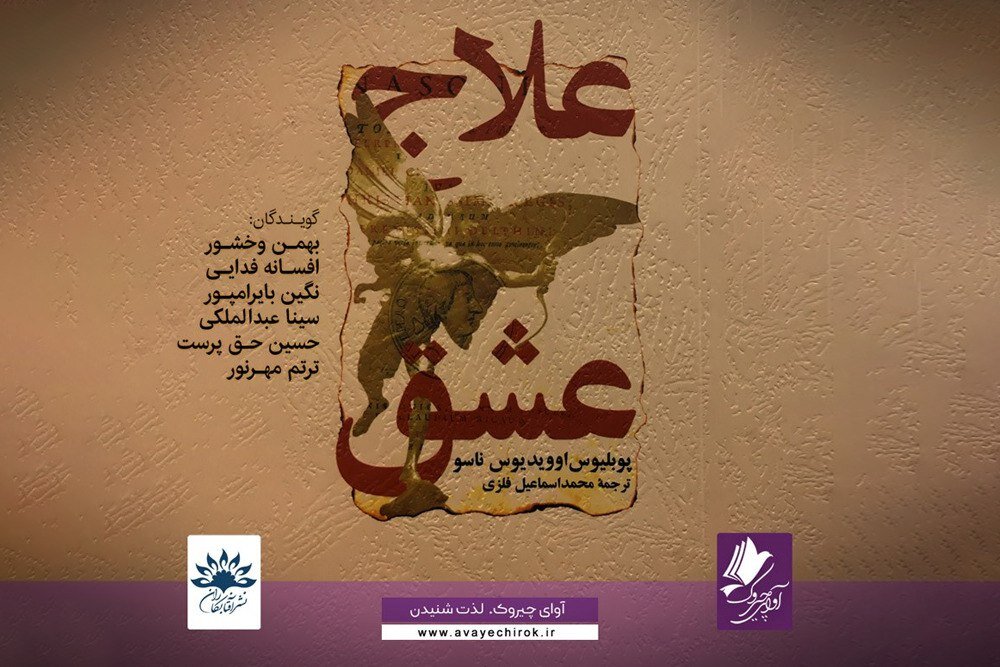"Love's Cure" presented in audio format for Persian audience

TEHRAN- The audio version of the Roman poet Publius Ovidius Naso’s “Love’s Cure” has recently become available to Persian listeners.
Narrated by Bahman Vakhshour, the audiobook has been crafted at Avaye Chirok, a major Iranian institute that produces audiobooks.
The audiobook showcases the translation by Mohammad Ismail Felezi, derived from the written edition of the book, which had been previously released by Aftabkaran Publications.
Narrators Afsaneh Fadai, Negin Bayrampur, Sina Abdolmaleki, Hossein Haqparast and Taranom Mehrnoor have also collaborated with the project.
Publius Ovidius Naso, commonly known as Ovid, was a prominent Roman poet who lived during the reign of Emperor Augustus in the first century BC. Ovid's works are widely renowned for their poetic brilliance and profound influence on Western literature. Born in Sulmo, Italy, Ovid's literary contributions encompass a range of topics and themes, from love and mythology to social commentary.
One of Ovid's most famous works is "Metamorphoses," an epic poem that examines the transformation of individuals in Greek and Roman mythology. Through vivid storytelling and intricate descriptions, Ovid explores the various myths of gods, heroes, and mortals, showcasing their metamorphoses into animals, plants, and other forms. "Metamorphoses" is not only a fantastical account of these transformations but also a metaphorical exploration of the human experience, delving into themes of change, identity, and the complexities of human emotions.
The Love Books of Ovid, also known as Ovid's love poetry, comprises several of his most notable works that explore the intricate and often tumultuous nature of human relationships. These works include "The Loves" (Amores), "The Art of Love" (Ars Amatoria), "Love's Cure" (Remedia Amoris), and "The Art of Beauty" (Medicamina Faciei Femineae).
"The Loves," or Amores, is a collection of elegiac poems that depict the poet's turbulent love experiences. Divided into three books, Ovid delves into the passionate and tumultuous emotions associated with love, exploring themes of seduction, desire, and heartbreak.
"The Art of Love," or Ars Amatoria, is a didactic poem in three books that offers humorous advice on maintaining successful relationships. This work was immensely popular in Ovid's time but ultimately led to his exile due to its perceived subversive nature.
"Love's Cure," or Remedia Amoris, is a poetic guide that serves as a follow-up to "The Art of Love." In this work, Ovid presents a series of remedies for the afflictions of love. He offers advice on how to move on from heartbreak, resist temptation, and free oneself from the grips of a destructive relationship. This work showcases Ovid's skill in crafting engaging and practical advice intertwined with his signature wit.
"The Art of Beauty," or Medicamina Faciei Femineae, is a lesser-known work attributed to Ovid, possibly serving as a satirical guide for women looking to enhance their appearance. This poem is a playful exploration of beauty rituals and cosmetics, providing instructions on remedies and techniques to achieve attractiveness. While the work is not as widely studied as Ovid's other love poetry, it offers insights into ancient beauty practices and societal perceptions of personal adornment.
Ovid's Love Books collectively highlight his skill in crafting engaging poetry that explores the complexities of human relationships. Through his wit, charm, and intimate understanding of love's triumphs and tribulations, Ovid's works have continued to captivate readers for centuries, making him one of history's most revered love poets.
Despite facing political setbacks, Ovid's literary creations continue to captivate readers to this day. His unique perspective and insightful observations of human nature make his works both timeless and influential. Ovid's impact on Western literature can be seen in the works of countless poets and writers who have been inspired by his themes and poetic style. From his poignant exploration of mythology in "Metamorphoses" to his advice in "Ars Amatoria," Ovid's contributions to literature remain an essential part of the literary canon.
SAB/
Leave a Comment